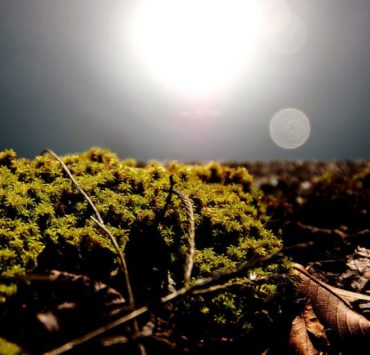
I don’t care what you heard, my mother was not a witch. She was a curandera, a healer and a mystic, but sometimes people misunderstand what that means. Regardless, she was definitely not a bruja. A curandera and a bruja are like day and night, life and death. Only idiots think that all magic is the same—Jesucristo was a healer too, after all. Let me ask you this: Would a witch trudge to church every week of her life, struggling through the snow to make it to communion, or quiz her daughter on passages from the Bible? Would a witch die with her old brass and turquoise rosary clutched in her hand, its crucifix smoothed down from years of devotion? She kept the faith—of that there can be no doubt.
Yes, my mother was a healer, performed miracles. Faith and magic are not incompatible, you know. That’s just how Protestants like to pretend the world works, and I couldn’t care less what one of them thinks about her anyhow.
Healing wasn’t how she paid the bills—that was by doing laundry at Presbyterian Hospital, a job she held from before I was born until the day she died, pero it was what everyone in the neighborhood knew her for. Curanderismo filled our lives and our house. I grew up in a brown adobe square of a building, two bedrooms and a combination kitchen–living room overflowing with clutter. Velas on every surface, some burning and some burned out, and some only to be burned on the most sacred occasions. Paintings of santos on every wall, carvings of santos on every flat surface. Bundles of dry, brittle herbs and vegetables hanging from the house’s vigas. Yerba buena tea and powders ground from her metate y mano on the counter, prayer books and a black-and-white television always murmuring in the living room. The sound of chickens in the backyard coop, the smell of tortillas and beans mixing with incense in every room of the house. This was where I grew up.
Even though it was packed with the evidence of Mamá’s calling, our house was just as noteworthy for what it lacked. There was no heating or cooling system aside from the fireplace and windows. There was no man in the house. Even our cats were mujeres, and my male friends made any excuse they could think of to avoid entering the front door, its borders painted turquoise to ward off evil spirits. Jesucristo and some of the santos were male, but they were already dead, and Mamá always preferred la Virgen anyhow. More than anything else, though, the house was missing one key element: money.
This never seemed to bother Mamá. She didn’t have to be seen at school wearing home-sewn dresses while all the other girls wore Jordache jeans and GUESS blouses. Mamá wouldn’t pay for me to own jewelry or makeup. Even during senior year, I walked to school because she wouldn’t buy me a car. And at home it was the same foods, huevos and beans and pans full of green chile enchiladas made to last an entire week. But really it was the clothing that bothered me the most, the way you could tell just from looking at me that I got my lunches free from the district. Being poor is bad enough, pero having everyone else know you’re poor? That might as well be hell.
Even though it put me in debt, I moved into the dorms for college. I wanted to blend in, you know. I took out extra loans and went over to Thrift Town and purchased a whole new wardrobe. I bleached and dyed my hair while everyone else was at orientation, going punk not because I liked the music or even the look but because it was cheaper than anything else—wearing safety pins for earrings meant I was “edgy” and wearing the same ripped clothes every day meant I was “making a statement.” Mamá hated it, but by then that only made me happier. During the first week of school, I made up for all the rebellion I’d missed earlier in life, ditching classes, getting drunk with my roommate Bella, and sleeping with men just because I could.
I didn’t completely transform during college or forget where I came from, even though most of the time I wanted to. Growing up, I hated going to San Ignacio with Mamá every Sunday, but I still attended Mass during college, spiked hair and all. I prayed to la Virgen y los santos for everything from grades to boys. I don’t know what I really believed back then, maybe none of it, maybe all of it, but the traditions weren’t easy to drop.
During sophomore year, I was taking one of those large history lectures with Bella. We liked to get there early because the air conditioners were all in the front of the hall and the walls at the back got so hot from the sun that you’d have to sweat through the whole hour. We’d sit there and watch the other students pile in, whispering about anyone who looked particularly funny or weird or, most important, cute.
This was how we spent a lot of our time together, and because we fundamentally disagreed about what made a guy attractive, we could argue at length. Bella was into machismo. The men she dated had wifebeaters and tattoos beneath their leather jackets. They were in a band or in a gang or on parole. Her relationships never lasted long, because as sexy as she thought those guys were, she didn’t like their violence and mood swings. She was a chica who wanted to tame her man, and we bonded over her series of failures. She always needed a shoulder to cry on until she found her next crush, and I was more than willing to supply that shoulder so long as she kept me updated on all the juicy details.
No lie, I barely cared what they looked like, at least in the traditional sense. Or what they did for fun, what they liked to talk about, whether they were más o menos listos, any of that crap. I knew that the one way to get out of Martineztown for good was to find a man con mucha plata, and at UNM those weren’t as easy to come by as you might think. A lot of guys liked to act preppy, popping the collars of their polo shirts and walking to class as if they owned the place, then driving back home in a beat-up Camaro, just like the boys I grew up with. So I scouted for signs of real wealth. Expensive watches were key, but also haircuts and even backpacks. It was easy to know what clothes to buy, pero there was a certain smugness to the truly wealthy, a way they seemed to colonize the area around them, that I learned to pick up on.
Early in the semester, I noticed a boy in a bright-red Lacoste shirt and khaki pants strolling down the stairs. A girl was at his side, a Barbie clone whose expression looked as molded as the doll’s. Two friends accompanied them, seemingly tethered to him by invisible strings. The light glinted off his gold Rolex and onto his carefully tousled bangs, and I knew what I wanted.
I nudged Bella.
“I see him,” she said. “But you know his girl’s right there.”
“Not now,” I said. “Just wait.” I didn’t have a plan then, but I’ve always been patient, and I knew something would come to me.
Two days later, at the next history lecture, we sat closer to him. And even closer the one after that. Bella seemed amused, and since this was the first guy I’d seriously gone after since losing interest in meaningless sex early freshman year, she did everything she could to encourage my infatuation. I tried to explain to her that it wasn’t an infatuation, it was a matter of appraising an investment, but she just laughed at me.
I tried wearing low-cut shirts and tighter jeans. I dropped the whole punk thing and dyed my hair back to black, brushed it sleek and shiny. I borrowed Bella’s perfume and makeup, tried to catch his eye all through class and bump into him afterward. Nothing worked. He just sat there listening through the world’s longest and most boring lectures, his arm around a different but identical bimbo every couple weeks. As we neared the end of the semester and I still didn’t even know his name, I became desperate.
Like I said, Mamá was not a witch. She didn’t use magic for evil, would never condone it, pero that doesn’t mean she didn’t cast spells or brew potions. And growing up the only daughter of a curandera, you learn things, even if you’re not particularly interested. Mamá had occasional apprentices she trained, and I simply watched and learned. Her remedios were a part of our day-to-day life. We didn’t have Neosporin for infections, we had ailé. Oshá for flus and chalahuite for an upset stomach, mariola for lung and liver problems and altamisa de la sierra for high blood pressure. But my mom wasn’t just una yerbera, era una sobadora y una partera and, most importantly, una espiritualista.
One of Mamá’s clients had been a young wife whose husband was already cheating. Mamá advised her to leave him. She was young and beautiful, you know, with no children to tie her down. Why stay with such a man when she could find ten more in a day who would treat her como una princesa? This woman, though, she cried and tried to explain that despite his infidelity, she still loved him. So Mamá made her a potion and told her to pray the rosary every day, and a month later, when she came by the house to thank Mamá for her services, the woman explained that her husband had become a new man. He’d stopped sleeping around, was devoted to her, and she felt it was all because of Mamá’s potion.
Mamá said it was nothing. She was careful to never promise that her remedios would work, said that even los santos knew that the only one who could predict these things, could control whether they worked or not, was Dios himself . . . or maybe la Virgen.
So as the end of the semester approached, I snuck into my mother’s backyard while she was working at the hospital. There I found her prized datura in full bloom, a white flower with hints of lavender deep in its petals. I carefully dug around it, then pulled off the end of one of its roots. I mixed this with a pinch of chile powder, some cornmeal, a half cup of milk, some mashed worms, and finally—and most importantly—a drop of my own urine. I stirred this mixture, clockwise, over the stove for half an hour while saying prayers to Santa Therese de Lisieux, Santa Teresa Urrea, San Nicholas, San Valentine, and every other remotely relevant santo I could think of. I knew that datura could be poisonous, but it was also the most powerful herb Mamá had, and I was using only a tiny cut of its root, not a seed or petal.
The next day before class, I told Bella about the love potion. I just needed to find a way to slip it into the Coke he always brought with him. Even a drop of it would be enough. Bella laughed at me, but I could tell she was a bit spooked. And excited.
I sat next to him, and all through class, I couldn’t concentrate. My heart pounded, not because of his presence—boys never made me nervous—pero . . . because I’d never tried making this potion on my own before. What if he caught me? What if even that small bit of datura proved poisonous? What if I’d said the wrong prayers?
The professor paced to the side of the classroom, and my target’s gaze followed him. I leaned over the table and squeezed an eyedropper of my mixture into his soda. A minute later, I watched him take a big swallow. Nothing happened, and relief washed over me. The potion was puro mentira, like all Mamá’s beliefs. Of course it was.
Class ended, and I felt depressed. As we were leaving the auditorium, Bella asked if I’d done it, and I said no, because I didn’t want her to find out that it hadn’t worked. That I was a failure, a sap who thought some psychosomatic bullshit was real. I was so distracted that I stumbled on the stairs, dropping my textbooks and falling.
“¡Maldita sea!” I said—my apologies for the cursing—my knees scraped and stinging. I sat there for a few seconds, not caring that I was holding up everyone behind me.
Then, a voice I recognized asked, “Are you ok?” He lifted me up, then picked my books off the ground.
“I’m fine,” I said.
“I’m John,” he said. He was staring straight at me, like we were the only ones in the room, the city, the universe. He stared at me so hard, and with such desire, I barely caught what he said.
“Sorry about what happened there. That looks real bad.” He pointed at my knee, and I was so surprised I didn’t know what to say, so I just kind of grunted.
“Hey, so would you like to get coffee?” he asked.

Sean Gandert is the author of the novels American Saint and Lost in Arcadia. Born and raised in Albuquerque, New Mexico, he has an MFA in creative writing from Bennington College. A freelance writer and college English instructor, he currently lives in Florida with his wife and an increasingly large pride of cats.







